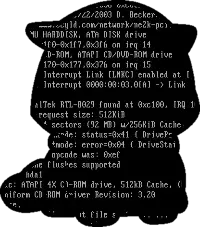Generated by TLDR This:
I don’t know what I did wrong, but I’ve angered one of the titans of the internet!
Unfortunately, not every web request can run the Cloudflare challenge page.
So, my original offense might not even have been against Cloudflare.
I had a terrible experience online for almost a week before everything cleared up.
The extension provides, what Cloudflare claims, is a privacy-preserving alternative to resolving CAPTCHA s on its challenge pages.
This might have affected the situation, but again, I have no insight into Cloudflare’s automated decision-making.








 Someone PISSED OFF Cloudflare, but NOT for the reasons you think
Someone PISSED OFF Cloudflare, but NOT for the reasons you think 





Jump in the discussion.
No email address required.
I don't know why you're thinking of this as a hypothetical, it's a system that exists, you could just read the whitepaper.
Jump in the discussion.
No email address required.
I was being lazy and didn't want to research on my own. I also like to think this stuff out on my own to get an intuitive understanding.
To answer my question:
These key holders basically function as a hand-off ICANN.
TLDs are handled by smart contracts, which presumably establish the pricing rules for purchasing names within that TLD. My understanding is that these domain name purchases necessarily require compatible cryptocurrencies due to the algorithmic smart-contract enforcement. This seems like a major barrier to more widespread implementation.
It would be an absolute nightmare to try to shift the existing internet DNS infratructure onto this protocol.
Also, an interesting snippet in the FAQ:
Emphasis mine. This is indicative of the performance issues I was referring to previously. Decentralizing this functionality necessitates more information exchange between peers, thus further increasing bandwidth demand by this protocol.
Overall, though, fascinating stuff. I'm glad I looked into it.
Jump in the discussion.
No email address required.
This seems like a pretty trivial thing for browsers to do.
Jump in the discussion.
No email address required.
I misread it, the resolver handles the nameprep but the protocol itself requires that nameprep be done beforehand. In short, the protocol can encode bad data into the blockchain. This leads to problems like this.
Also, upon further reading, I see that the name resolution does not take place within the chain. The blockchain stores an owner and resolver for a namehashed entry, but the mapping of the name to an address takes place within a server listed as the resolver within the registry blockchain. When writing my previous comments, I was under the impression that address resolution took place within the blockchain.
Jump in the discussion.
No email address required.
More options
Context
More options
Context
More options
Context
More options
Context